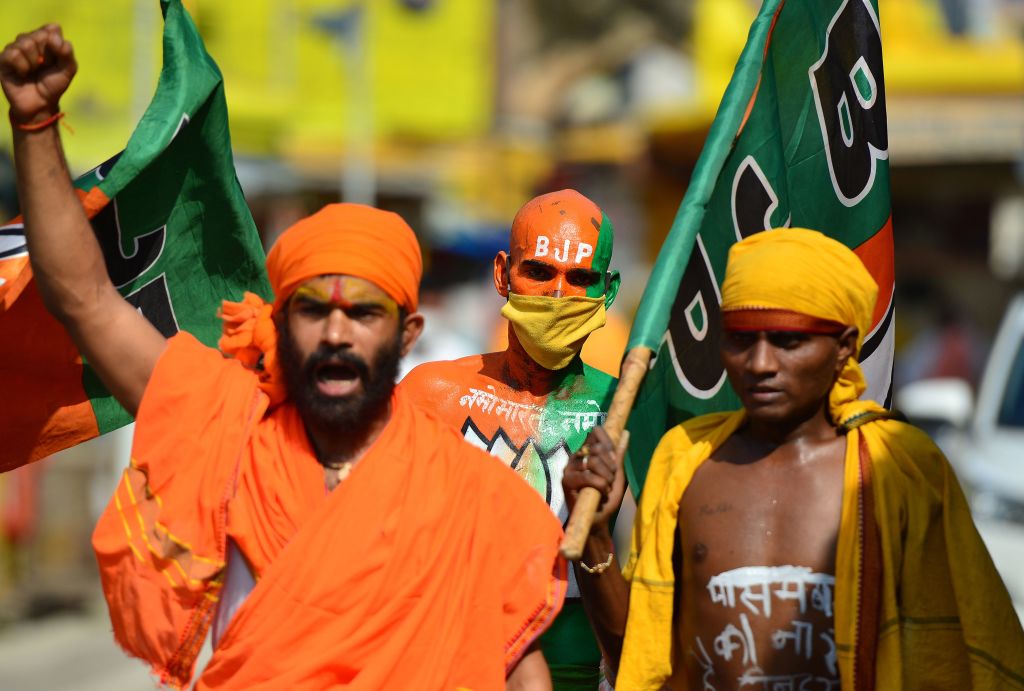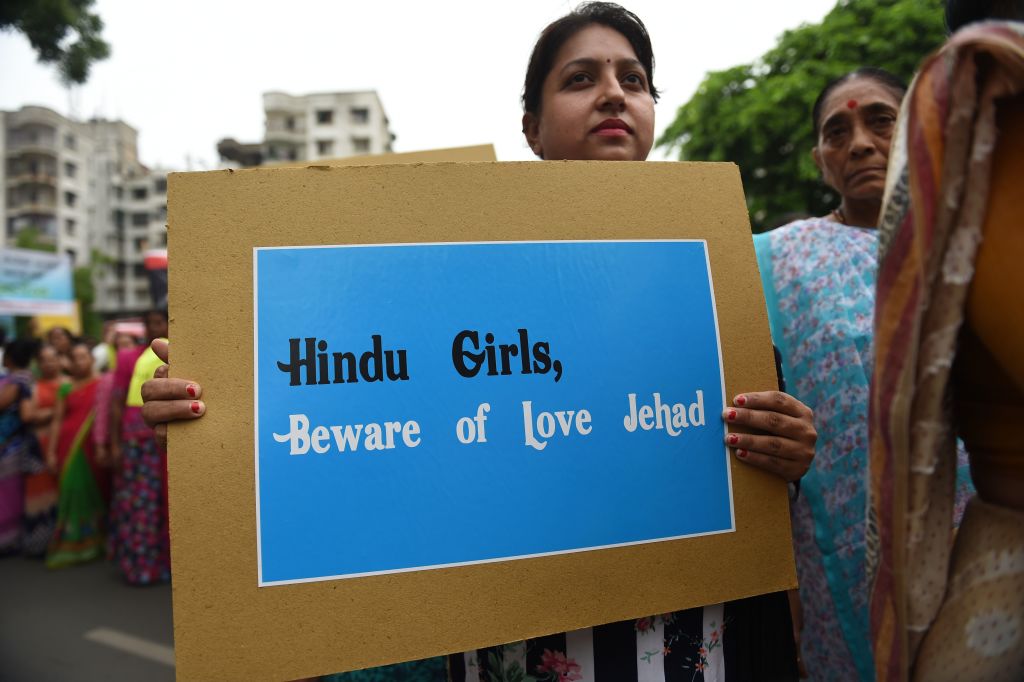
Even Netflix wasn’t ready for this plot twist. The central Indian state of Madhya Pradesh last week registered a police case against two of the streaming company’s top India executives. Their supposed crime: a scene in the Netflix drama series A Suitable Boy. It had “hurt the feelings” of Hindus, the Madhya Pradesh government said, by its portrayal of a Muslim boy kissing a Hindu girl with a temple in the frame.
The police action was based on a complaint by a youth leader of the ruling Bharatiya Janata Party (BJP), who alleged Netflix was promoting “love jihad.” This oxymoron is an old Hindu supremacist trope of a supposed international Islamist conspiracy in which Muslim men seduce unsuspecting Hindu women into marriage, convert them to Islam and use them as child-producing factories, with the end game of numerically overtaking Hindus in India and turning it into an Islamic republic.
Popular with the Hindu nationalist party’s foot soldiers and the most ardent of votaries of majoritarian fundamentalism, “love jihad” used to be the stuff of the fringe. Not anymore. Since Prime Minister Narendra Modi’s ascent to national power in 2014, anti-Muslim mobilization has been on the rise and hate speech and toxic tropes have colonized daily life in India, deepening the fault lines between its Hindu population (80 percent) and Muslim minority (14 percent).
Following Modi’s thumping re-election as prime minister last year, the BJP has been pushing its Hindu nationalist program with even more vigor as it interpreted the back-to-back victories as popular consent for its majoritarian project of remaking secular India as a de facto Hindu state. It dismembered India’s only Muslim-majority province, Jammu and Kashmir; enacted a new law that explicitly prevents Muslim refugees from applying for Indian citizenship, linking citizenship to religion in India’s secular democracy for the first time; and has raised the specter of a citizen verification drive that Muslims fear may disenfranchise them.
Read more: Why India’s Most Populous State Just Passed a Law Inspired by an Anti-Muslim Conspiracy Theory
A concerted campaign is under way to assert Hindu primacy and render Muslims invisible in a rewritten history, from renamed public spaces to political and other spheres of public life. The subtext of this new playbook is that Muslims must lie low in a new India where Hindus are more equal than others. “Love jihad” has consequently traveled from the fringes to mainstream legitimacy as part of a state-sponsored campaign to show the Muslim ‘other’ their place. A jewelry company last month had to withdraw its advertisement featuring the baby shower of an interfaith couple after it was set upon by the Hindu right-wing troll army, which is now hash-tagging to boycott Netflix.
Hindu vigilante groups have in the past used the ruse of “love jihad” to disrupt mixed weddings and harass and intimidate interfaith couples even though investigations by state agencies in the past have found no evidence of such a conspiracy theory. Relentless online misinformation campaigns—enabled by compliant social and legacy media platforms that do the ruling dispensation’s bidding—have now established the trope of lustful and criminal-minded Muslim man as a truism and “love jihad” as a clear and present danger. In a climate of hate, love is now a conspiracy.
In reality, mixed marriages are rare in India. Hindu endogamy rules mean marriages seldom cross caste boundaries, let alone religious lines. But “love jihad” is too good a dog whistle to pass up for the lack of evidence. Like everywhere else, laws to prevent interfaith or interracial marriages appeal to Indian conservatives because they help reinforce their desired social hierarchy. They are also a means of preserving the patriarchal order by exercising community control over women’s sexuality and turning their bodies into a political battleground bereft of any personal agency.

In the U.S., laws against “miscegenation” (a term coined by Abraham Lincoln’s opponents to describe interracial relationships) survived for more than 300 years. They not only helped enforce segregation and maintain a racial hierarchy with whites at the top, but were also handy tools to deny women property and inheritance rights. As India turns the clock back on its constitutional precepts of social equality, it comes as no surprise that it should be weighing similar legislation.
Laws prohibiting interracial marriages in the United States were declared unconstitutional by the Supreme Court in 1967, in a turbulent decade of quest for racial equality. That year, TIME celebrated a mixed wedding on its cover and Guess Who’s Coming to Dinner surprised theater goers with its theme of a white woman bringing her black boyfriend to meet her parents.
As America’s democracy came of age, the U.S. Supreme Court’s verdict burying anti-miscegenation laws voided the bogey of racial amalgamation that fed post-Civil War white supremacist ideas of a color-coded racial hierarchy. Half a century on, and half a world away, supremacists of a different persuasion— and skin tone—are resurrecting similar laws and signal, this time, the demise of a democracy.
Read more: It Was Already Dangerous to Be a Muslim In India, Then Came the Coronavirus
Within days of filing a police case against Netflix, the Madhya Pradesh government announced that it was doubling the jail term for forced religious conversions for marriage from five years to 10 years in its draft bill against “love jihad”. It took the cue from Uttar Pradesh, India’s most populous state, where the cabinet cleared a vaguely worded “Unlawful Religious Conversion Prohibition Ordinance (2020)” the day before.
Also couched in the language of proselytization, the Uttar Pradesh ordinance states marriages will be declared null and void if the “sole intention” is to “change a girl’s religion,” with up to 10 years of imprisonment for forced conversions through marriage. It also requires interfaith couples to give officials a notice of two months before they marry—just enough time for local vigilantes to pull back the delinquents from the abyss of love. The BJP chief minister of the state, Yogi Adityanath, a saffron-robed cleric with a history of rioting and incitement against Muslims, mainstreamed the buzz over “love jihad” when he recently threatened death for “those who… play with the honor of our sisters and daughters.”
It didn’t matter that the High Court in his own state just weeks ago pronounced that the “right to live with a person of his/her choice, irrespective of religion professed by them, is intrinsic to right to life and personal liberty” while overturning an earlier ruling in a case filed against a Muslim man by the parents of his Hindu wife. Or that the Supreme Court had in 2018 similarly set aside an order annulling an interfaith wedding. Or that a special police team in Uttar Pradesh specifically appointed to investigate “love jihad” said it found no proof of a conspiracy. In a fast regressing India, such plot twists are now only to be expected.
More Must-Reads from TIME
- Cybersecurity Experts Are Sounding the Alarm on DOGE
- Meet the 2025 Women of the Year
- The Harsh Truth About Disability Inclusion
- Why Do More Young Adults Have Cancer?
- Colman Domingo Leads With Radical Love
- How to Get Better at Doing Things Alone
- Michelle Zauner Stares Down the Darkness
Contact us at letters@time.com